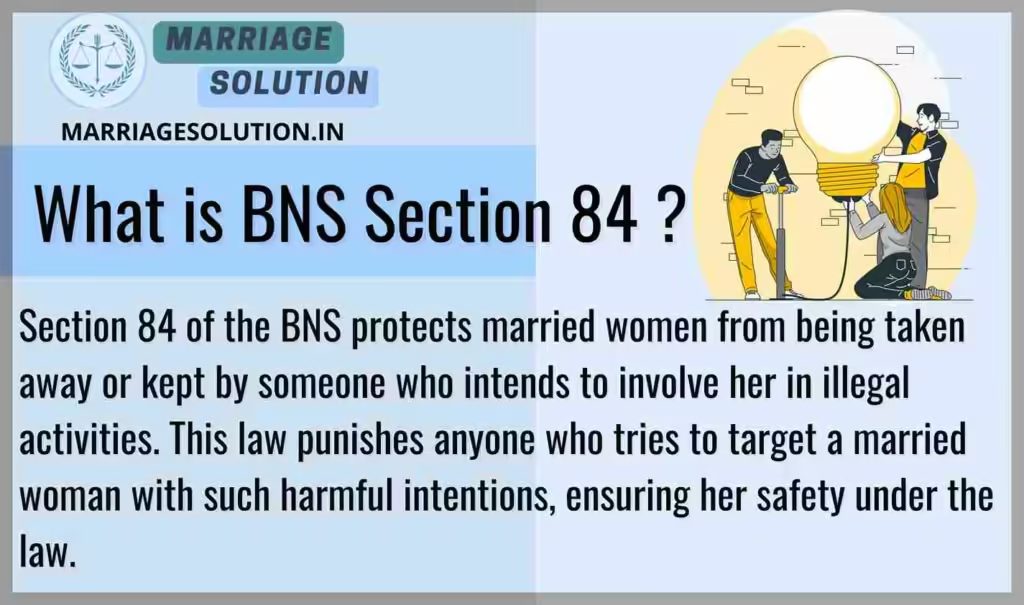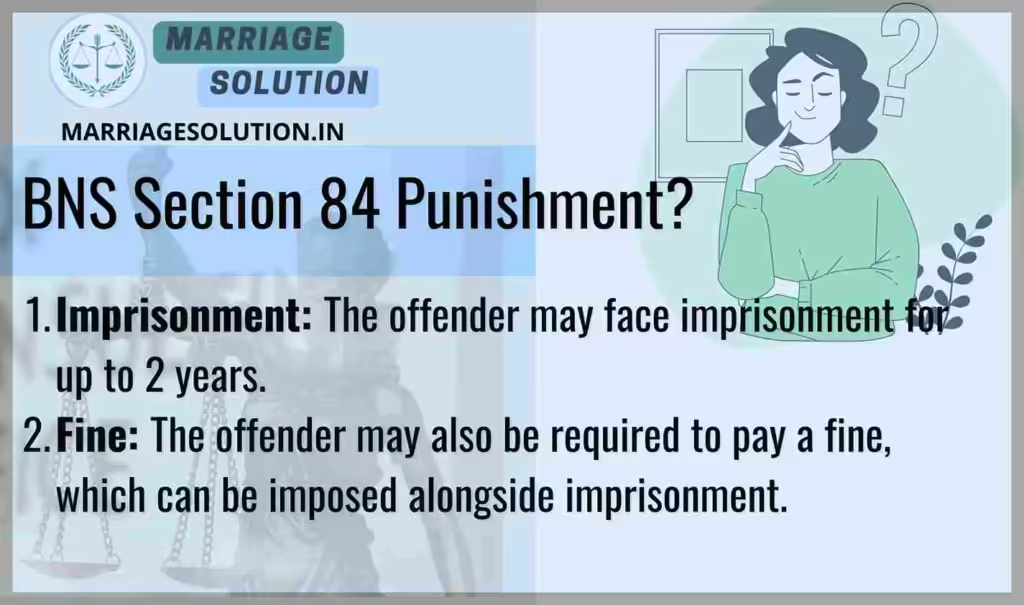Introduction of Section 84 BNS
Section 84 BNS deals with the offence of enticing, taking away, or detaining a married woman with the intention of involving her in illicit activities. The law provides protection to married women from being lured or wrongfully held against their will for immoral purposes by someone who knows or suspects that she is married.
This provision ensures women’s dignity, safety, and marital rights are safeguarded, while also sending a clear message that criminal intent against a married woman will not be tolerated.
What is section 84 of BNS ?
Section 84 of the BNS protects married women from being taken away or kept by someone who intends to involve her in illegal activities. This law punishes anyone who tries to target a married woman with such harmful intentions, ensuring her safety under the law.

Bharatiya Nyaya Sanhita Section 84
BNS Section 84 deals with cases where a person entices, takes away, or detains a married woman with the intention that she may engage in illicit intercourse with another man. This law is framed to safeguard the dignity, rights, and security of married women, while ensuring that such wrongful acts are punishable. It is the modern equivalent of IPC Section 498.
1. Meaning of Section 84
This section applies when a person knowingly tries to:
- Entice or lure a married woman.
- Take her away from her husband or lawful guardianship.
- Detain her against her will.
The key element is criminal intent – the act must be done with the intention that she may engage in illicit sexual relations with another person.
2. Purpose of Section 84
The purpose of this section is:
- To protect married women from exploitation or wrongful confinement.
- To preserve the sanctity of marriage by preventing outsiders from interfering in the relationship.
- To punish individuals who knowingly act with malicious intent against the woman’s dignity.
3. Essential Ingredients of Section 84
For an act to fall under Section 84, the following must be proved:
a. Knowledge of Marital Status – The accused must know, or have reason to believe, that the woman is married.
b. Act of Enticing or Detaining – The accused must have either lured, taken away, or detained her.
c. Criminal Intention – The purpose must be to make her engage in illicit intercourse with another person.
4. Punishment under Section 84
- Imprisonment up to 2 years, or
- Fine, or
- Both imprisonment and fine together.
This flexible punishment allows courts to impose penalties based on the seriousness of the offence.
5. Legal Classification of the Offence
- Cognizability: Non-Cognizable – police cannot arrest without a warrant.
- Bailability: Bailable – the accused has the right to bail.
- Compoundability: Compoundable – the case can be settled between parties with the court’s permission.
- Triable By: Any Magistrate.
6. Examples of Section 84 in Action
- Example 1: A man lures a married woman away from her husband and detains her with the intention of forcing her into an illicit relationship. This is punishable under Section 84.
- Example 2: A person keeps a married woman at his place against her will, knowing she is married, with an immoral purpose. This also falls under this section.
- Example 3 (Not Punishable): If a woman willingly leaves her husband without inducement or force, and no illicit intention can be proven against another person, Section 84 may not apply.
7. Importance of Section 84
- Protects the dignity and security of married women.
- Prevents outsiders from interfering in marital relationships.
- Acts as a deterrent against luring or detaining women for immoral purposes.
- Modernizes IPC Section 498 by making the law clearer and more structured under BNS.
Section 84 BNS Overview
BNS Section 84 deals with the act of taking, enticing, or detaining a married woman with the intent that she may engage in illicit intercourse with someone. The section specifies the punishment for such an act, emphasizing the protection of married women from being lured or held with wrongful intentions.
10 Key Points Explained in Detail
Intent to Commit an Offence
The central idea of this section is criminal intent. It applies when a person knowingly takes, entices, or detains a married woman with the intention of engaging her in an unlawful sexual relationship with another. Even if the act is not completed, the mere intent behind it is enough to attract legal punishment.
Protection of Married Women
This law is designed to protect married women from being exploited or wrongfully detained. It recognizes the importance of safeguarding the dignity, safety, and rights of women while also preserving the sanctity of marriage. By penalizing those who attempt to interfere in this relationship, the law offers a strong shield against exploitation.
Imprisonment as Punishment
An offender found guilty under this section can face imprisonment for up to two years. Although the term may seem limited compared to more severe offences, it acts as a clear deterrent, sending the message that such acts of interference and exploitation are unacceptable.
Fine as an Additional Punishment
Besides imprisonment, the offender may also be required to pay a fine. This additional financial penalty ensures that punishment is not only custodial but also economic, making it more impactful for the offender.
Option of Both Imprisonment and Fine
The law allows the court to impose both imprisonment and a fine together, depending on the severity of the case. This flexibility ensures that the punishment can be tailored according to the seriousness of the wrongful act.
Non-Cognizable Offence
This offence is classified as non-cognizable, meaning the police cannot arrest the accused without a court-issued warrant. This classification ensures that judicial oversight is maintained before any legal action is taken.
Bailable Offence
Since it is a bailable offence, the accused has the right to apply for bail. This ensures that while the offence is punishable, the accused is not unnecessarily deprived of liberty before being tried in court.
Compoundable Offence
The offence is compoundable, meaning it can be settled between the parties without a full trial. This option allows for reconciliation or private settlement if both parties agree, thereby reducing the burden on the judicial system.
Triable by Any Magistrate
Cases under this section can be tried by any Magistrate, ensuring accessibility and quick disposal of such matters. This provision avoids unnecessary delays and ensures that justice is available at the local level.
Focus on Criminal Intent
The most important element of this section is criminal intent. The law does not only look at the act itself but also the purpose behind it. If the intention is to exploit, deceive, or endanger a married woman by enticing or detaining her, the offender is liable for punishment.
BNS 84 Punishment
Imprisonment: The offender may face imprisonment for up to 2 years.
Fine: The offender may also be required to pay a fine, which can be imposed alongside imprisonment.

BNS 84 bailable or not ?
BNS Section 84 is bailable, meaning the accused has the right to apply for bail and can be released from custody pending trial.
Comparison: BNS Section 84 vs IPC Section 498
| Section | What it Means | Punishment | Bail | Cognizable? | Trial By |
|---|---|---|---|---|---|
| BNS Section 84 | Deals with enticing, taking away, or detaining a married woman with the intent that she may engage in illicit intercourse with another person. | Jail up to 2 years, or fine, or both. | Bailable (accused can seek bail) | Non-Cognizable (police need warrant to arrest) | Any Magistrate |
| IPC Section 498 (Old) | Earlier law punishing anyone who entices, takes away, or keeps a married woman with the intent that she may have illicit intercourse with another person. | Jail up to 2 years, or fine, or both (same as BNS). | Bailable | Non-Cognizable | Any Magistrate |
The Bharatiya Nyaya Sanhita (BNS) Section 84 replaces the old Indian Penal Code (IPC) Section 498
BNS Section 84 FAQs
What does BNS Section 84 cover?
It covers the act of enticing, taking away, or detaining a married woman with the intent of involving her in illicit activities.
What is the punishment under BNS Section 84?
The punishment includes imprisonment for up to two years, a fine, or both.
Is BNS Section 84 bailable?
Yes, it is a bailable offence, meaning the accused can be released on bail.
Can someone be arrested without a warrant under BNS Section 84?
No, it is a non-cognizable offence, so a warrant is required for arrest.
Who handles cases under BNS Section 84?
Cases can be tried by any magistrate.
Can BNS Section 84 cases be settled out of court?
Yes, it is a compoundable offence, which means it can be settled outside of court with the victim’s consent.
Conclusion
Section 84 BNS plays an important role in safeguarding married women from being enticed, taken away, or wrongfully detained with criminal intent. By prescribing punishment of up to two years imprisonment, fine, or both, the law ensures dignity and marital sanctity are protected. At the same time, by classifying it as bailable, compoundable, and non-cognizable, the law balances fairness with judicial oversight.
This section reflects the progressive shift from IPC to BNS, making the justice system more protective, accessible, and effective for women’s safety in India.
Need Legal Support?
If you are dealing with court cases, marriage problems, or any other legal issue, our team at Marriage Solution – Lawyer Help is here for you. Simply fill out our quick online enquiry form, and we’ll connect you with the right legal expert to support your needs.
Finished with BNS 84 ? Continue exploring the next provisions of the Bharatiya Nyaya Sanhita (BNS), 2023. Each section includes explanations, examples, and plain-language breakdowns for easy understanding.
Of Offences Relating To Marriage
- Section 85 BNS : Husband or relative of husband of a woman subjecting her to cruelty.
- https://marriagesolution.in/bns_section/section-85-bns/
- Section 86 BNS : Cruelty defined .
- https://marriagesolution.in/bns_section/section-86-bns/
- 87 BNS : Kidnapping, abducting or inducing woman to compel her marriage, etc .
- https://marriagesolution.in/bns_section/87-bns/
- Section 88 BNS : Causing miscarriage .
- https://marriagesolution.in/bns_section/section-88-bns/
Full IPC Section List: https://marriagesolution.in/ipc-section-list
All Indian Law & Blogs: https://marriagesolution.in/indian-law/
Full BNSS Section List: https://marriagesolution.in/bnss_section-list
